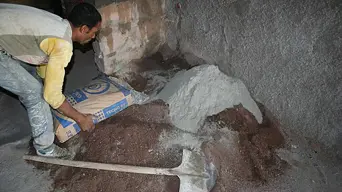Why the cement industry is crumbling and the implications for SA
Researchers warn that cheap cement imports imperil the local industry, and the safety of building construction down the line.

Cement worker. Image: Lahoucine Boukhanchouch on Wikimedia Commons
Bruce Whitfield interviews Rowan Goeller, director at equities research outfit Chronux Research.
South Africa's cement producers are facing the threat of plant closures and job cuts, warns Chronux Research.
Their latest Cement Import Monitor found that cement imports were up nearly 18% last year.
According to the study, imports increased to 979 kilotons in 2023, tracking up to January this year.
Vietnam is the primary source, with smaller amounts coming from Mozambique and Namibia.
The study also found that imports of clinker (used to produce cement) to Gqeberha came from countries in the Middle East.
Chronux Research director Rowan Goeller says it's not clear how these high volumes are managing to get through in the face of the logistical problems at our ports.
"Imports are coming in at cheap levels, and surprisingly high levels... given all the challenges we've had at the ports."
"It's placing a lot of strain on the local industry, which has got its own challenges of fairly low demand at the moment."
"If you add clinker imports into the mix you've got 1.5 million tons coming into the country; that's over 10% of overall volume, overall demand."
Rowan Goeller, Director - Chronux Research
The other worrying aspect is that a lot of blended cement is entering South Africa as regulatory standards have dropped over the years, Goeller says.
He emphasizes that the consumer needs to be protected from substandard goods.
"When it comes to building materials, across the whole of South Africa there's a general downscaling to what one has to say are substandard goods."
"They may be cheap, but there is a reason for that."
Rowan Goeller, Director - Chronux Research
Goeller says it's the kind of environment where government should be stepping up to help the industry.
It's not so much about protectionism as about enabling local producers to compete on an equal footing, he notes.
For more detail, listen to the interview audio at the top of the article